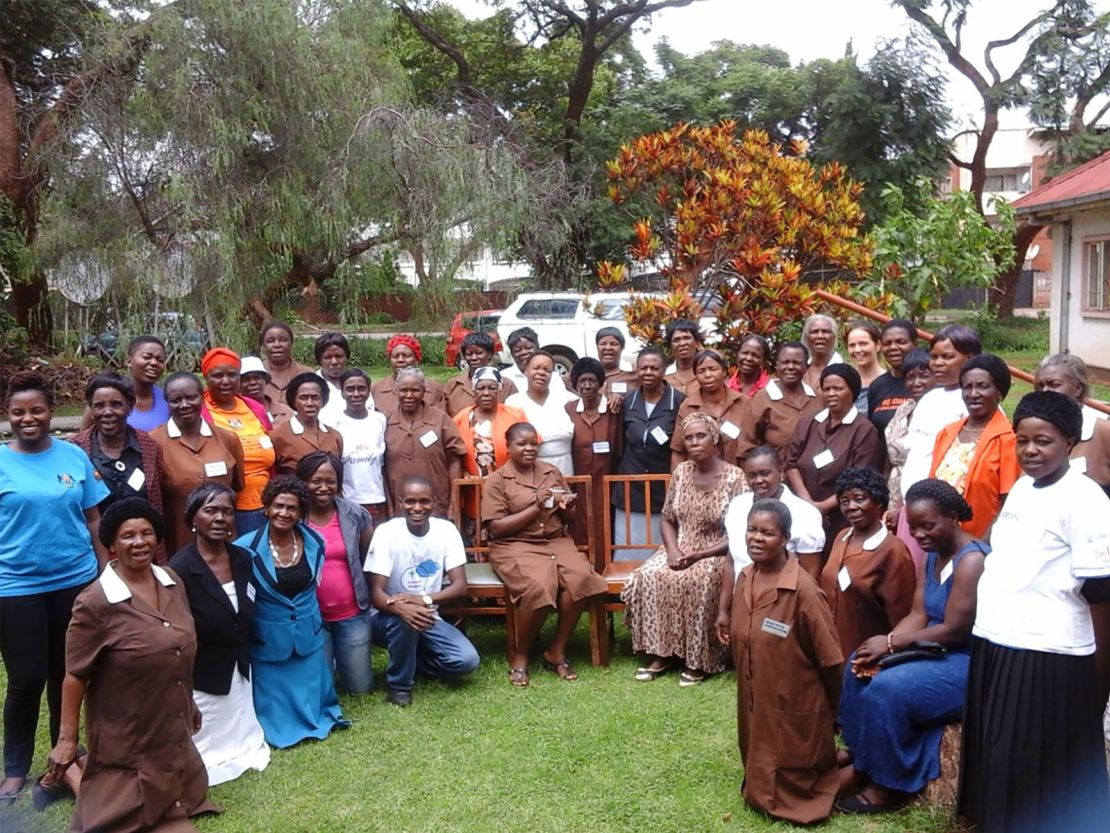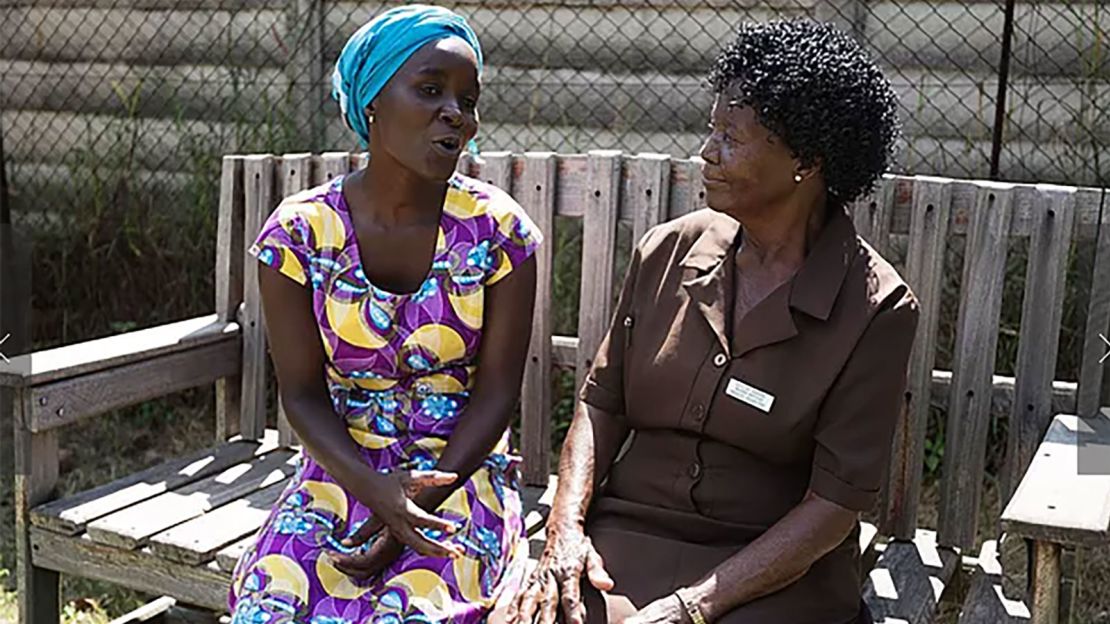Story highlights
An estimated 322 million people live with depression, the majority in non-Western nations
The Friendship Bench project offers basic psychological therapy from grandmothers
Dixon Chibanda spent more time with Erica than most of his other patients. It wasn’t that her problems were more serious than others’ – she was just one of thousands of women in their mid-20s with depression in Zimbabwe. It was because she had travelled over 160 miles to meet him.
At the time, in 2004, Chibanda was one of only two psychiatrists working in public healthcare in the whole of Zimbabwe, a country of over 12.5 million people. Both were based in Harare, the capital city. Erica, on the other hand, lived in a remote village nestled in the highlands of eastern Zimbabwe, next to the border with Mozambique.
Erica had passed her exams at school but was unable to find a job. Her family, she thought, wanted her only to find a husband. To them, the role of a woman was to be a wife and a mother. She wondered what her bride price might be. A cow? A few goats? As it turned out, the man she hoped to marry chose another woman. Erica felt totally worthless.
Erica and Chibanda met every month for a year or so, sitting opposite one another in a small office at the hospital. Chibanda prescribed Erica an old-fashioned antidepressant called amitriptyline, hoping that after a month or so, she might be better able to cope with the difficulties back home in the highlands.
You can overcome some life events, no matter how serious, when they come one at a time or in a small number. But when combined, they can snowball and become something altogether more dangerous.
For Erica, it was lethal. She took her own life in 2005.

Today, an estimated 322 million people around the world live with depression, the majority in non-Western nations. It’s the leading cause of disability, judged by how many years are ‘lost’ to a disease, yet only a small percentage of people with the illness receive treatment that has been proven to help.
In low-income countries such as Zimbabwe, over 90 per cent of people don’t have access to evidence-based talking therapies or modern antidepressants. Estimates vary, but even in high-income countries such as the UK, some research shows that around two-thirds of people with depression are not treated.
As Shekhar Saxena, the Director of the Department of Mental Health and Substance Abuse at the World Health Organization, has put it: “When it comes to mental health, we are all developing countries.”
Soon after Erica’s death, Chibanda changed his career plans. Instead of pursuing his original goal of opening his own private practice – a role that would, to an extent, limit his services to the wealthy – he founded a project that aimed to provide mental health care to the most disadvantaged communities in Harare.
“There are millions of people like Erica,” Chibanda says.
Discovering Zimbabwe’s high levels of depression
In the early 1990s, Harare – nicknamed the Sunshine City – appeared to radiate positivity. A survey from the city reported that fewer than 1 in every 4,000 patients (0.001 per cent) that visited the Outpatients department had depression.
In comparison, around 9 per cent of women in Camberwell in London were found to be depressed.
This data fits snugly within the theoretical environment of the 20th century. Depression, it was said, was a Westernised disease, a product of civilisation. It wasn’t found in, say, the highlands of Zimbabwe or by the shores of Lake Victoria.
A handy metaphor of modernity, depression was just another division between the colonisers and the colonised.
But in 1991 and 1992, Melanie Abas, now a senior lecturer in international mental health at King’s College London, conducted a research visit to a low-income district in southern Harare named Glen Norah.
Along with her colleagues, Abas found that there was no equivalent word for depression in Shona, the most common language in Zimbabwe. There were, however, local idioms that seemed to describe the same symptoms.
Through discussions with traditional healers and local health workers, her team found that kufungisisa, or ‘thinking too much’, was the most common descriptor for emotional distress. This is very similar to the English word ‘rumination’ that describes the negative thought patterns that often lie at the core of depression and anxiety. (Sometimes diagnosed together under the umbrella term ‘common mental disorders’, or CMDs, depression and anxiety are often experienced together.)
“Although all of the [socioeconomic] conditions were different,” Abas says, “I was seeing what I recognised as pretty classical depression.”
Using terms such as kufungisisa as screening tools, Abas and her team found that depression was in fact nearly twice as common as in a similar community in Camberwell.
In 1978, the British sociologist George Brown had published The Social Origins of Depression, a seminal book that showed that unemployment, chronic disease in loved ones, abusive relationships and other examples of long-term social stress were often associated with depression in women.
Following the same research methods as Brown, Abas found that events of the same severity produced the same rate of depression, whether in Zimbabwe or in London. “It was just that, in Zimbabwe, there were a lot more of these events,” she explains.
In the early 1990s, for example, nearly a quarter of adults in Zimbabwe were infected with HIV. Without medication, thousands of households lost caregivers, breadwinners or both.
For every 1,000 live births in Zimbabwe in 1994, around 87 children died before the age of five, a mortality rate 11 times higher than that of the UK. The death of a child left behind grief, trauma and, as Abas and her team found, a husband who might abuse his wife for her ‘failure’ as a mother.
Adding to earlier reports from Ghana, Uganda and Nigeria, Abas’s work was a classic study that helped demonstrate that depression wasn’t a Westernised disease, as psychiatrists like Carothers had once thought.
It was a universal human experience.
A novel solution: the Friendship Bench
In the mid-2000s, Harare was hit hard by Robert Mugabe’s Operation Murambatsvina, or ‘Clear out the Rubbish’, a nationwide military-enforced removal of those livelihoods deemed to be either illegal or informal. Chibanda was the first to measure the psychological toll of Mugabe’s policies, finding that a large majority of those he surveyed met the threshold for clinical depression.
“It was then decided that something needed to be done,” Chibanda says.
There was no money for mental health services in Mbare. There was no option to bring therapists in from abroad. And the nurses already there were far too busy with dealing with infectious diseases, including cholera, TB and HIV. Whatever the solution – if one actually existed – it had to be founded on the scant resources the country already had.
A turning point came when Chibanda took on a group of new colleagues: 14 elderly women.
Grandmothers have been working as community health workers for clinics across Zimbabwe since the 1980s. Their work is as diverse as the thousands of families they visit, and includes supporting people with HIV and TB and offering community health education.
“They are the custodians of health,” says Nigel James, the health promotion officer at the Mbare clinic. “These women are highly respected. So much so that if we try to do anything without them, it is bound to fail.”
In 2006, they were asked to add depression to their list of responsibilities. Could they provide basic psychological therapies for the people of Mbare?
Chibanda was sceptical. “Initially, I thought: how could this possibly work, with these grandmothers?” he says. “They are not educated. I was thinking, in a very Western, biomedical kind of sense: you need psychologists, you need psychiatrists.”
This view was, and still is, common. But Chibanda soon discovered what a resource the grandmothers were. Not only were they trusted members of the community, people who rarely left their townships, they could also translate medical terms into words that would resonate culturally – like kufungisisa.
With the buildings of the clinic already full of patients with infectious diseases, Chibanda and the grandmothers decided that a wooden bench placed under the shade of a tree would provide a suitable platform for their project. It became known as the Friendship Bench.
With just a pen and paper, patients would answer 14 questions, with their health worker then determining whether they needed psychological treatment.

In the last week, had they been thinking too much? Had they thought of killing themselves? If someone answered ‘yes’ to eight or more of the questions, they were considered to be in need of psychiatric help. Fewer than eight and they weren’t.
Subsequent help would come in the form of problem-solving therapy. It’s a brief type of psychological therapy that aims to go straight to the potential triggers of distress: the social issues and stressors in life. Patients are then guided towards their own solutions.
In 2007, Chibanda trialled the Friendship Bench in three clinics in Mbare, with promising results. The next step was to fill in the gaps, adding a control and including a follow-up. In October 2011, the first study on the Friendship Bench was published.
Chibanda and his team then conducted a randomised controlled trial. At 24 health clinics in Harare, over 300 grandmothers were trained in an updated form of problem-solving therapy.
In 2016, a decade after Operation Murambatsvina, Chibanda and his colleagues published the results from the clinics, revealing that patients receiving Friendship Bench treatment showed a significant decrease in depressive symptoms.
Of course, not everyone found the therapy helpful. So Chibanda or another trained psychologist would visit the health clinics to treat those patients with more severe forms of depression.
Making the Friendship Bench sustainable
Although the Friendship Bench is more expensive than usual care, it has the potential to save money.
Get CNN Health's weekly newsletter
Sign up here to get The Results Are In with Dr. Sanjay Gupta every Tuesday from the CNN Health team.
Not only are people with depression less likely to keep returning to the health clinic if they receive adequate treatment, but there’s also a growing pile of studies showing that people with depression are far more likely to die from other serious diseases, such as HIV, diabetes, cardiovascular disease and cancer. On average, long-term depression reduces your lifespan by around 7–11 years, similar to the effects of heavy smoking.
Questions still remain as to whether projects like the Friendship Bench are sustainable at scale while maintaining a high quality of therapy over time. Michelle Craske, a professor of clinical psychology at the University of California, argues that the use of digital platforms – such as laptops, tablets and smartphones – is crucial to maintaining a consistently high level of care. Not only do they encourage lay health workers to follow the same methods as a trained professional, they automatically keep track of what has taken place in each session.
Even with accountability, I have been told there is only one route to sustainability: merging mental health with primary care. If such projects were a part of the public health system, receiving a regular slice of the budget, they could continue year on year.
Although Friendship Benches are now finding success in cities across the world, the project in rural Zimbabwe still holds a special place for Chibanda. His patient Erica lived and died in the eastern highlands of the country, a place where such services may have saved her life. What if she didn’t need to pay the bus fare to Harare? Did she have to rely solely on old-fashioned antidepressants? What if she could walk to a wooden bench under the shade of a tree and take a seat next to a trusted member of her community?
Such questions still plague Chibanda’s mind, even as we speak over a decade after her death. He can’t change the past. But with his growing team of grandmothers and peers, he is beginning to transform the futures of thousands of people living with depression around the world.

This story is an edited version of an article first published by Wellcome on Mosaic and is republished here under a Creative Commons licence.
Copyright 2015 The Wellcome Trust. Some rights reserved.




